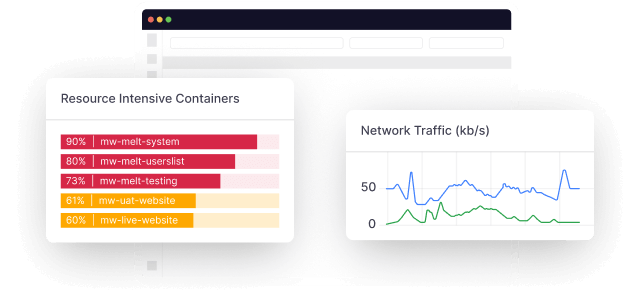Every team’s superpower is keeping things organized. But information within mountains of data is overwhelming and a sheer waste of time. This is where a search and analytics engine like Elasticsearch comes into the big picture.
But with over 50+ alternatives to Elasticsearch available today, how do you make the right choice? In this comprehensive guide, we’ve rounded the 7 best Elasticsearch alternatives for you to choose from. Let’s deep dive!
What is Elasticsearch?
Elasticsearch is a distributed, RESTful search and analytics engine. The platform offers horizontal scalability, reliability, and real-time search capabilities.
Built on top of Apache Lucene, it allows you to store, search, and analyze volumes of data quickly and in near real-time. In terms of applications, Elasticsearch is commonly used for log analytics, full-text search, monitoring, and as a data store for wide-ranging applications.
What should you look for in Elasticsearch alternatives?
Elasticsearch’s versatile toolkit allows users to revolutionize the search experiences for their customers and employees, all the while aligning it with their organization’s tech goals. Many use it to create AI-driven search apps, complete with customizable features and pre-built functions.
However, there are a few drawbacks users face, according to G2 reviews such as:
- Effort-intensive initial setup with complex configuration and onboarding processes.
- Poor and confusing user interface.
- Steep pricing.
So, what should you look for in Elasticsearch alternatives? Here are four factors to consider in the tool where Elasticsearch falls short:
- Should allow searches for multiple types of data, such as text, logs, metrics, and structured data.
- Must offer visual dashboards that present data insights clearly and intuitively and drive quick understanding as well as decision-making.
- Should deliver quick search results for large datasets and complex queries.
- Should come with an open API to accelerate integration with other systems and tools, thereby boosting the flexibility and scalability of your search experience.
Read on to learn more about the top 7 alternatives to Elasticsearch for 2025.
Top 7 Elasticsearch Alternatives to Be Mindful Of
1. Middleware
Middleware helps you to gain 360-degree visibility and insights into your infrastructure and applications—as opposed to Elasticsearch, which is essentially a search and analytics engine that helps you search, index, and analyze data.
In contrast to Elasticsearch, an open-source search engine, Middleware is a full-stack observability platform. This platform is delivered as a cloud-based service (SaaS), eliminating the burden of configuration and infrastructure management.
Middleware offers a comprehensive suite of tools for simplifying data collection and analysis, ensuring a holistic observability experience in the process. Let’s look at what these features offer.
Key features
- Search and filter feature serves as the jumping-off point in your data exploration process. You can use Filter Bar and Search Fields to sift through your data. To make things easier, the data is dynamically generated based on the integrations, applications, and infrastructure you have added within Middleware. You can filter data by attributes, date range, or project and easily switch between History and Live Modes to see historical or real-time data. This feature ties all data points together and gives you a complete view across Middleware.
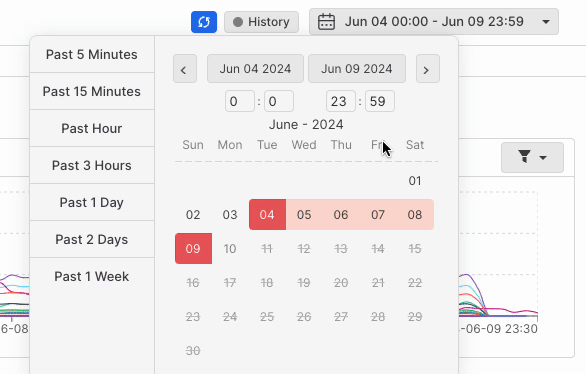
- Drill down feature helps you investigate, analyze, and solve issues without switching contexts. You can drill into the data in various formats, such as metrics, events, spans, traces, and logs. Instead of sifting through large volumes of data, you can focus on relevant subsets to save time and effort. All you need to do is click on Middleware’s interactive tables to access pop outs with related information. These popouts help you drill down to the root cause from any data point.
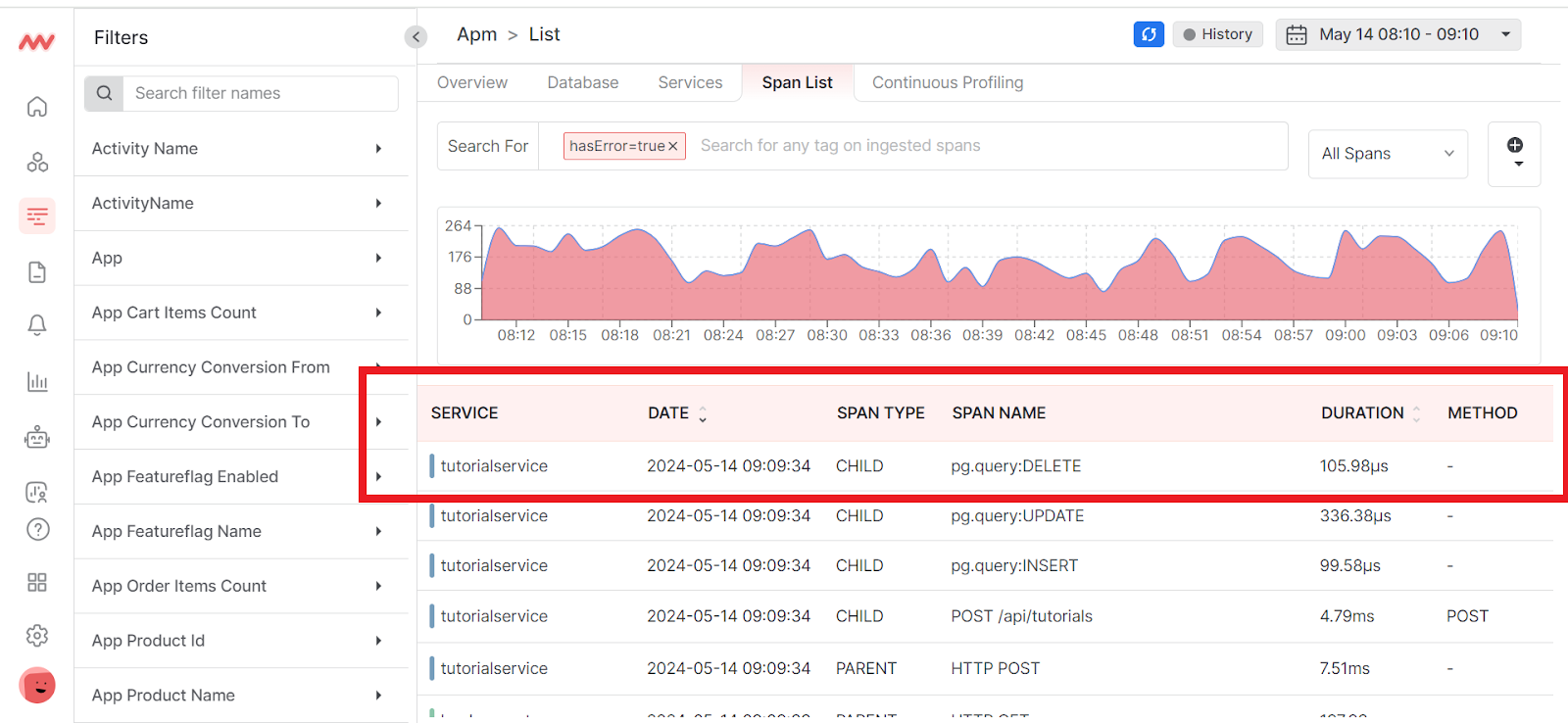
- Advanced infrastructure monitoring feature uses auto-detection capabilities to configure, collect, and visualize complex data across your stack. It also compresses as well as batches said data to your account for near analysis of clusters, nodes, pods, and services in real time.
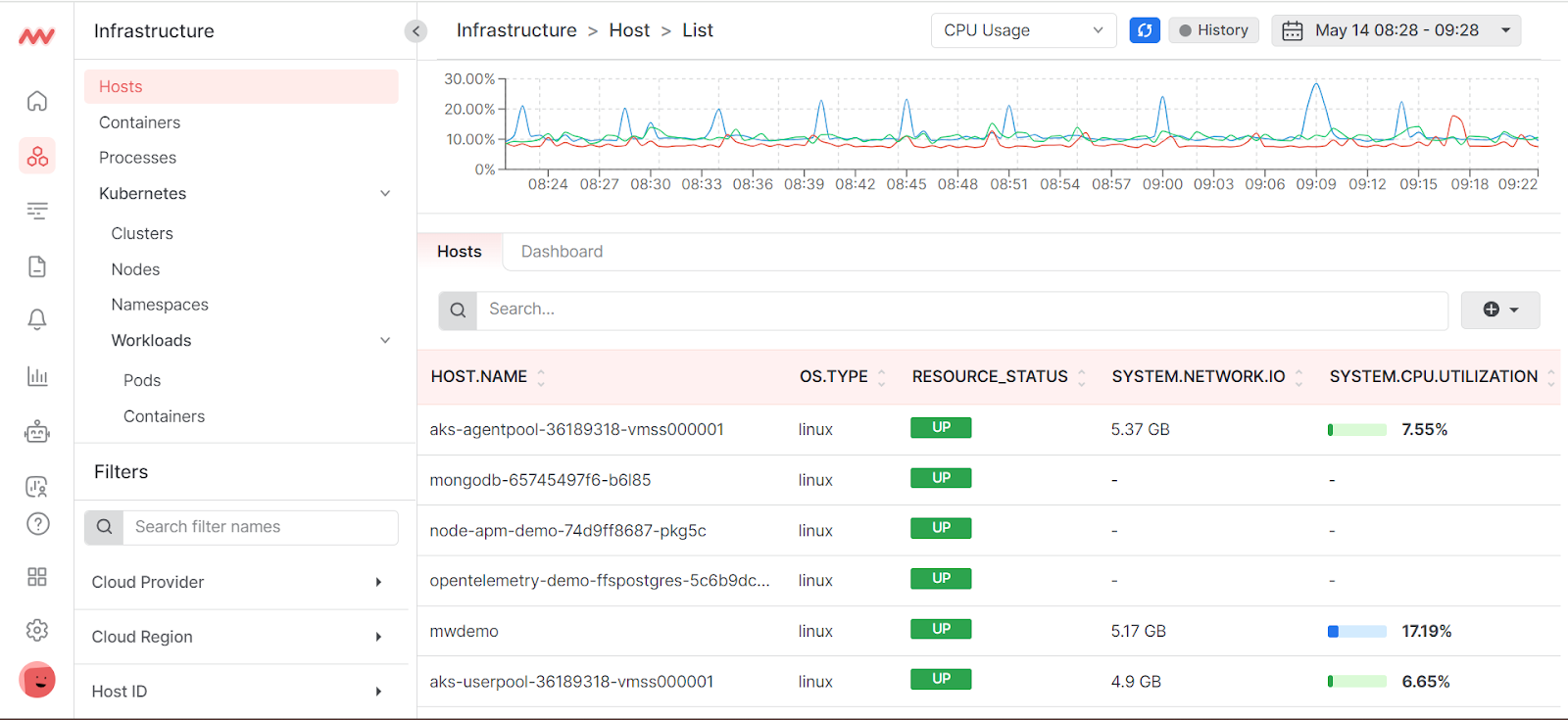
- Log monitoring page lets you visualize logs from servers, containers, cloud environments, and applications. It acts as a central interface for examining logs. You can also easily correlate events across different components in your architecture.
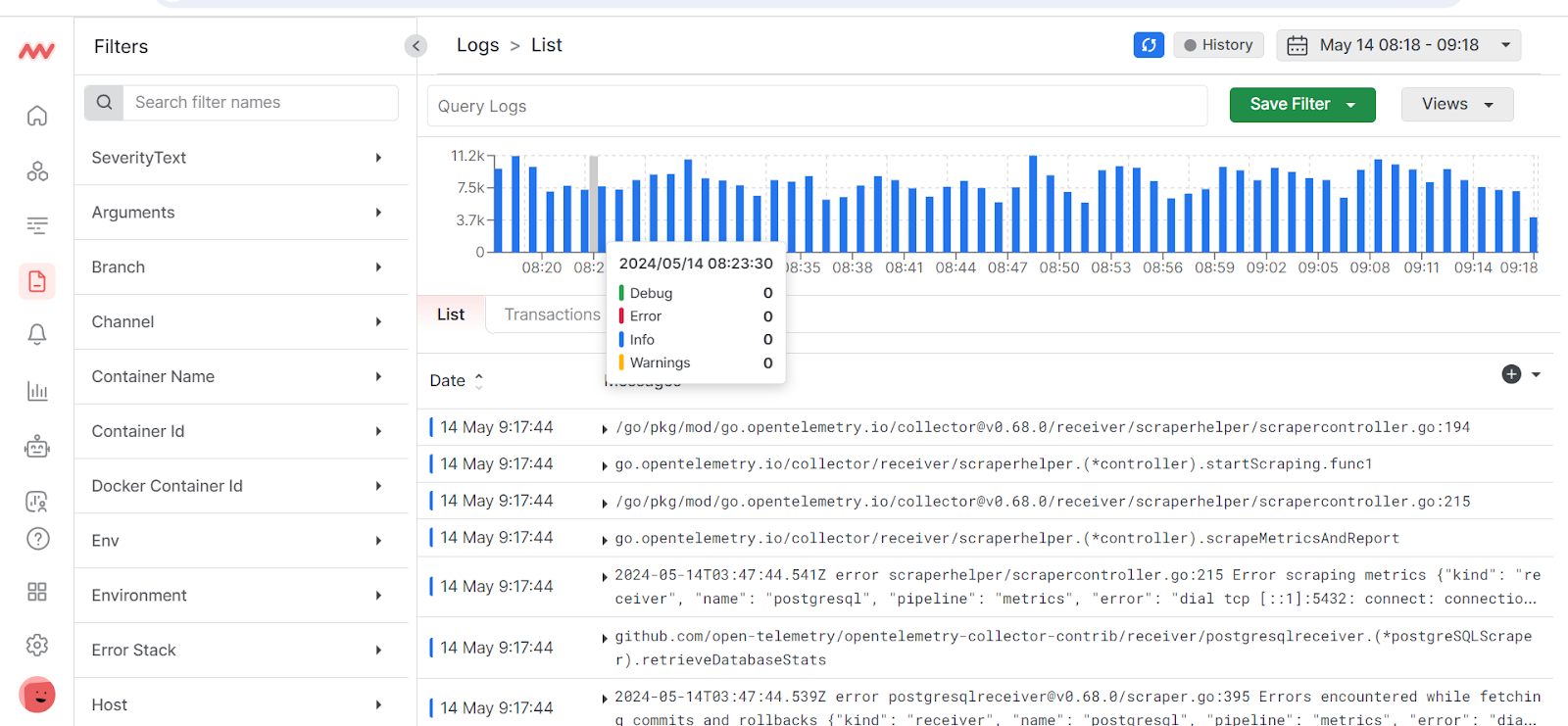
- Application Performance Monitoring (APM) feature offers end-to-end distributed tracing to help you monitor service dependencies and health metrics, reduce latency, and eliminate errors by correlating traces with frontend and backend data. With detailed application profiling, you can identify code bottlenecks and error-prone components. You can also analyze performance issues like slow database queries and unusual memory consumption.
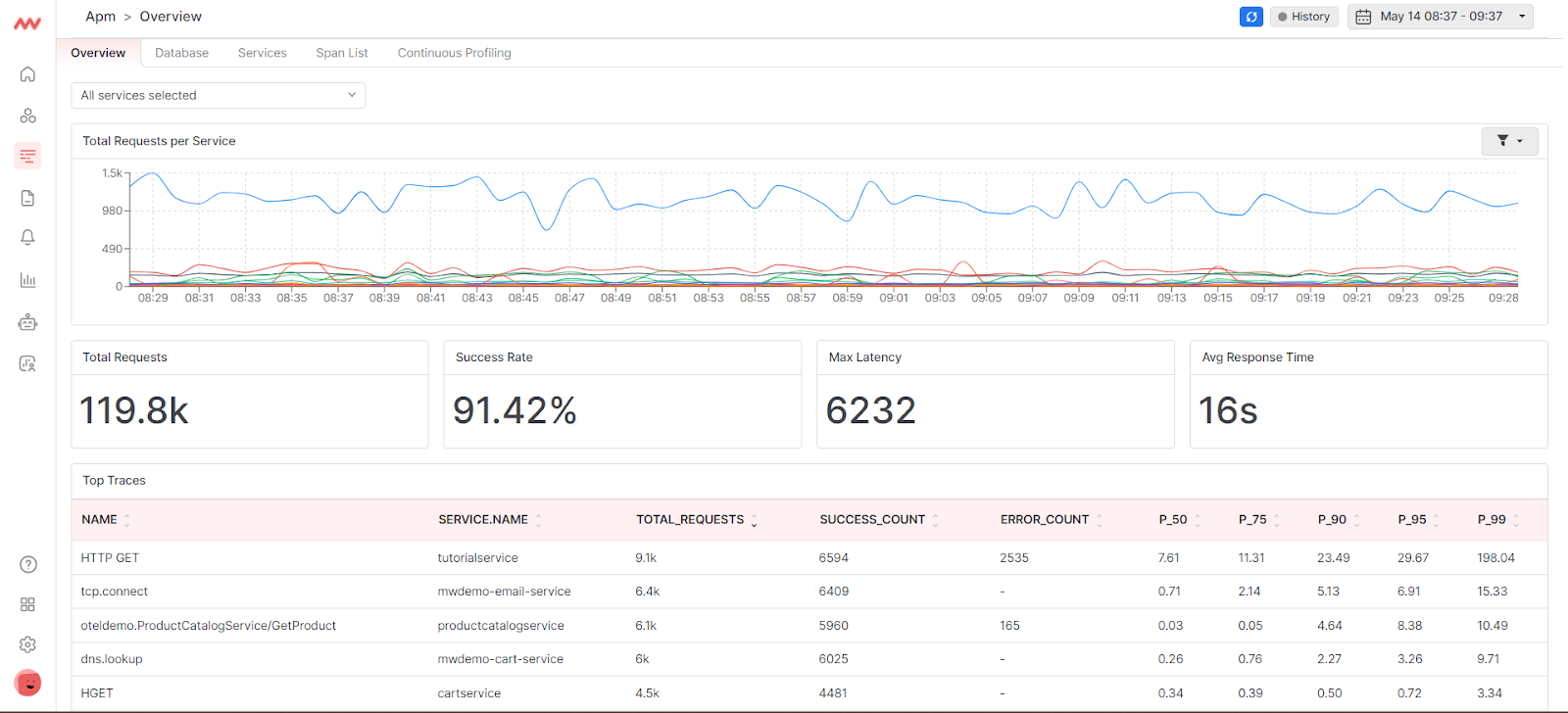
- Dashboard Builder lets you create new dashboards from scratch in under a minute, add custom widgets to existing ones, and easily clone default dashboards for elevated customization. You can drill into any data within the software using advanced filters such as date range, metric value, or metric attribute.
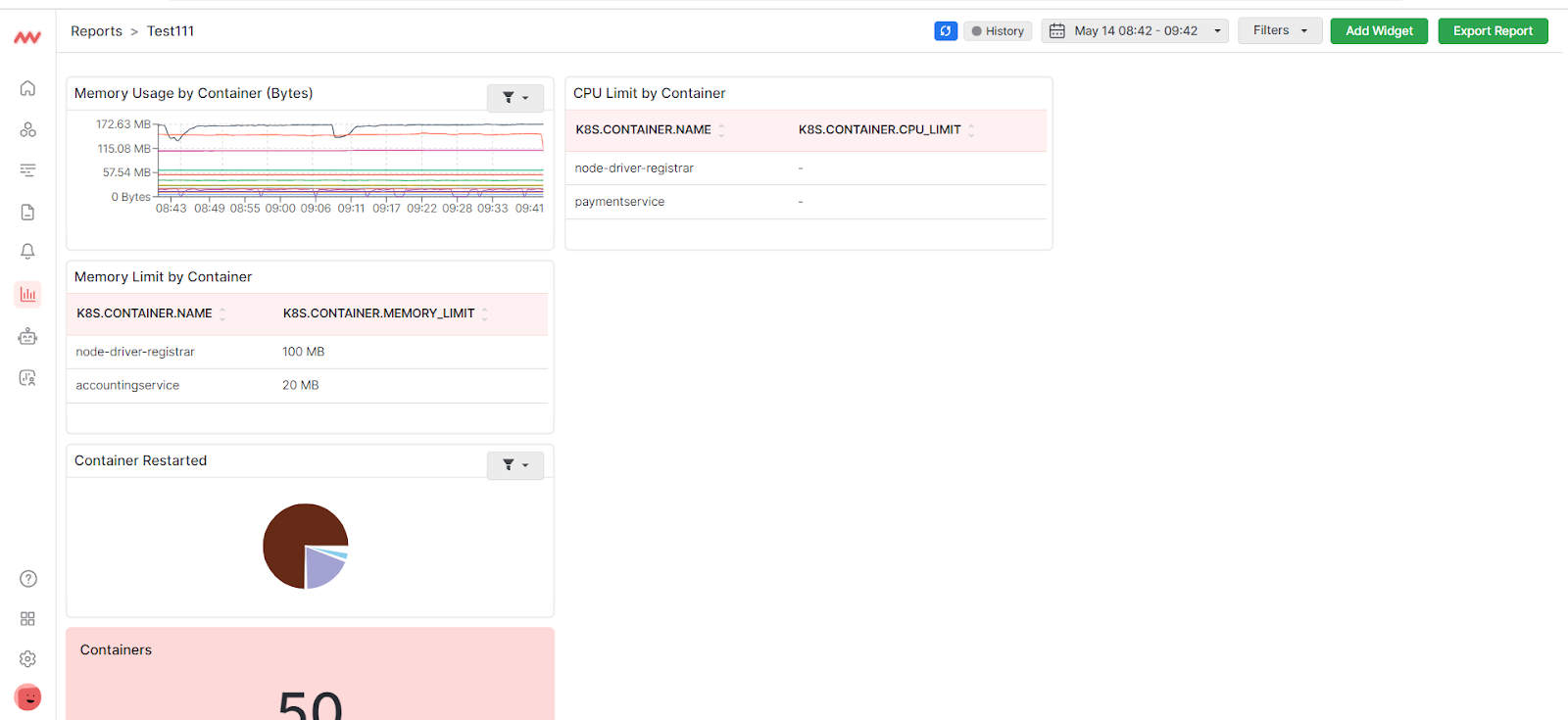
- Alerts functionality helps you monitor and respond to critical events across your infrastructure. You can create alerts to detect system anomalies, monitor a specific Kubernetes node, or use telemetry data to manage system-wide issues effectively. Remember that you can set alerts with metric, log, or trace data.
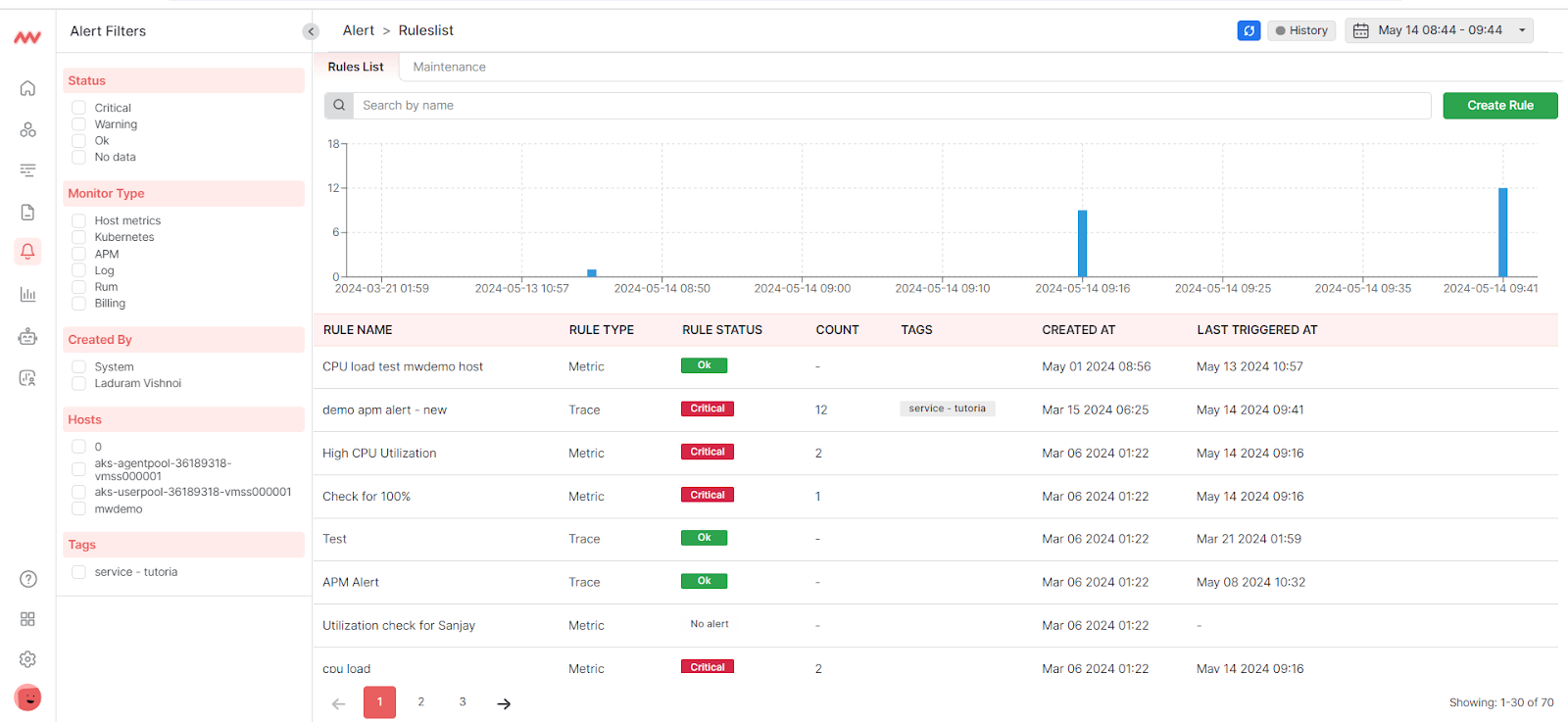
Pricing
- Free Forever: Free access to features with monthly limits
- Pay As You Go:
- Log monitoring: $0.3/1GB/month.
- Infrastructure monitoring: $10/ host/month.
- APM: $20/ host /month.
- Synthetic monitoring: $2 for 10K synthetic checks.
- Database monitoring: $49 per database host/month.
- RUM: $1/1000 sessions/month.
- Serverless monitoring: $5/1M traces/month.
2. Algolia
Algolia is an enterprise AI search and discovery platform that understands your customers—as well as you do. If you want to add AI-powered search to your app or website, Algolia is worth looking into. Reportedly, the tool powers 1.75 trillion search requests a year (or 30 billion searches a week).
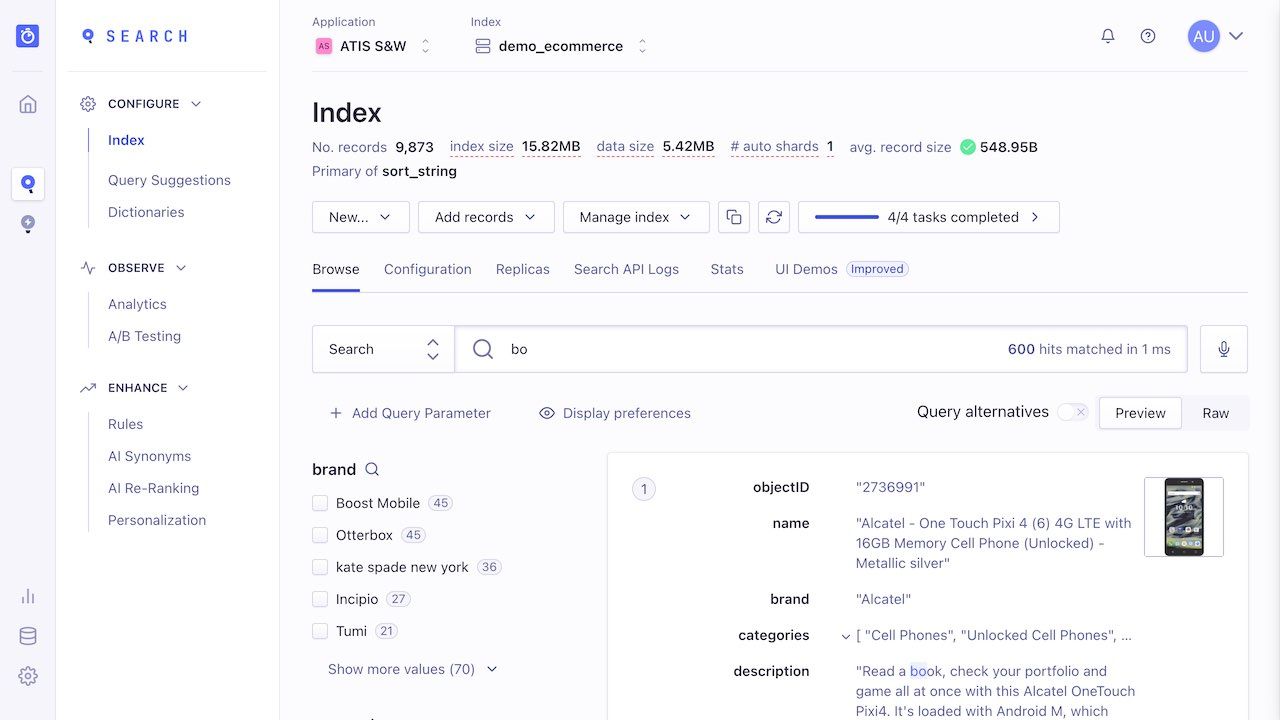
Algolia is an enterprise AI search and discovery platform that understands your customers—as well as you do. If you want to add AI-powered search to your app or website, Algolia is worth looking into. Reportedly, the tool powers 1.75 trillion search requests a year (or 30 billion searches a week).
Key features
- NeuralSearch combines semantic search with keyword search to help customers find what they’re looking for in seconds.
- Query categorization AI algorithm predicts and brings up relevant results from the most likely category.
- Dynamic ranking helps boost popular content to stay on top of what’s trending.
- Offers personalized search results, product listings, and recommendations aligned to each user.
- AI Synonyms automatically detects potential synonyms and helps you match more queries.
Pricing
- Build: Free.
- Grow: $0.50/month (Pay-as-you-go).
- Premium: Custom pricing.
- Elevate: Custom pricing.
3. Meilisearch
An open-source platform, Meilisearch enables you to set up an intuitive search experience. If improving search-based conversions is a top priority for you, this software is ideal. The tool returns search results within 50 milliseconds or less. Its plug-and-play interface allows you to search through data without wasting time on complex configurations.
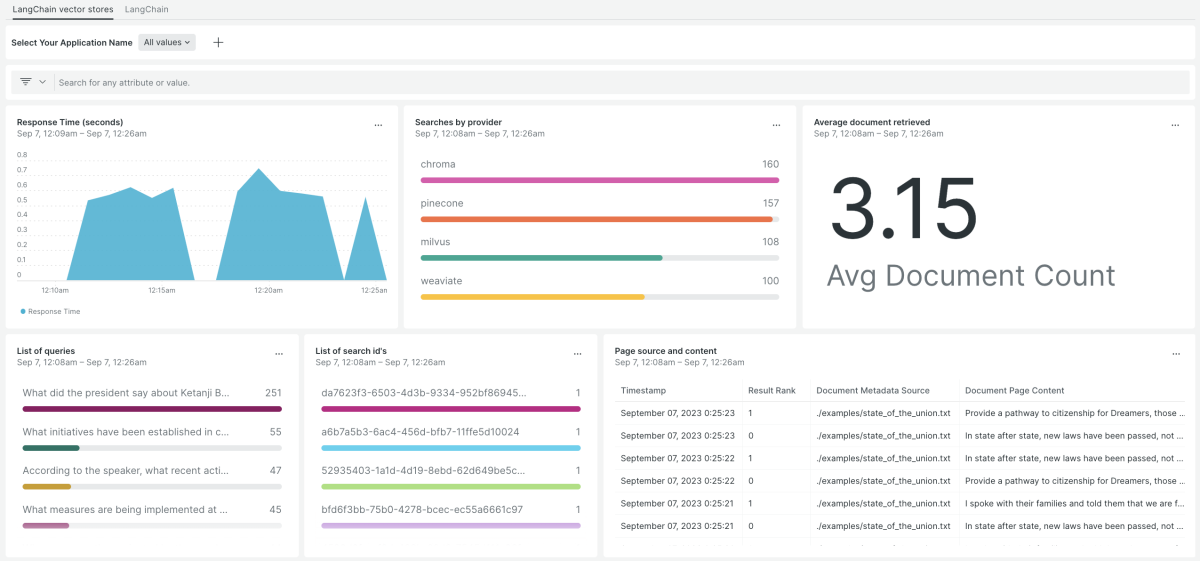
Key features
- Hybrid search gives you greater control over search setup as you can balance full-text search capabilities with AI semantic search.
- Ability to add prompt templates with important information to help ingest prompts.
- Allows for image, sound, and video search capabilities, making the experience more engaging.
- Q&A bots offer documentation and helpful articles, allowing users to find contextual answers.
Pricing
- Build: Starting at $30/month.
- Grow: Starting at $300/month.
- Enterprise: Custom pricing.
- Open-source: Free.
4. Typesense
Typesense is a fully open-source platform that’s typo-tolerant. This search server is easier to use than Elasticsearch and allows you to send search queries at the click of a button. The tool is powered by the latest technology, such as Machine Learning search algorithms, that enable you to search as you type.
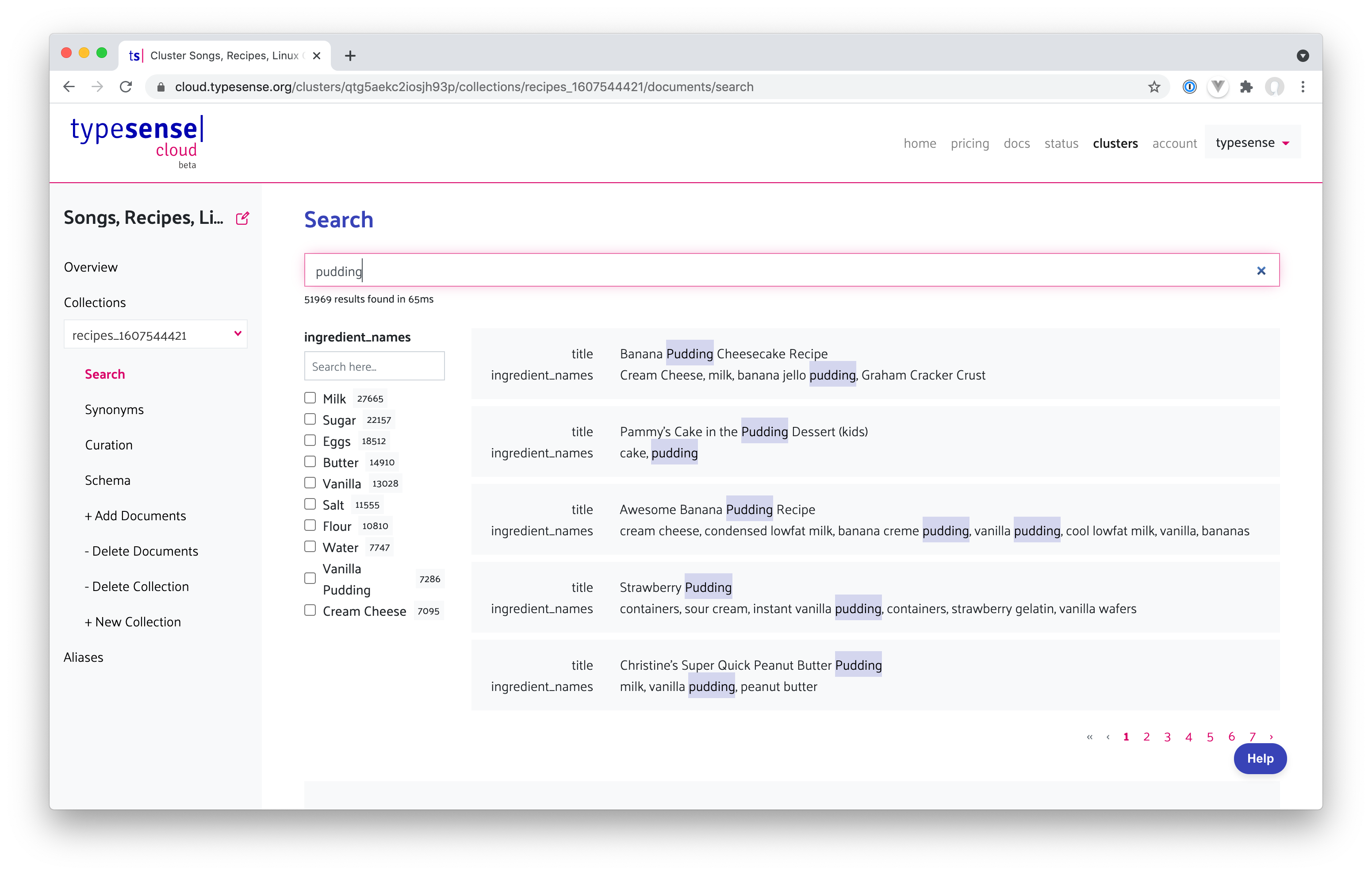
Key features
- Typo tolerance automatically tries to correct typos.
- Flexible and fast query-time ranking.
- Filtering and faceting fetch records that match your filter.
- Dynamic sorting helps sort records on the go using different fields such as price, sort by popularity, etc.
- Geo search allows you to search results within a certain distance.
- Federated search enables you to search for multiple collections within a single query.
Pricing
- Free to use (besides of course your own infra costs).
5. Xapian
Written in C++, Xapian is a flexible search engine library. Numerous programming languages are supported by it, such as Java, Tcl, Ruby, Perl, Python, PHP, Lua, and Node.js. In addition to offering ranked search results, this extremely flexible and adjustable platform makes recommendations for pertinent index terms and related documents.

If you want a robust and flexible search engine library, Xapian is a great choice. The platform offers extensive support for multiple programming languages and advanced search features.
Key features
- Leverage powerful full-text indexing and search capabilities.
- Get suggestions for misspelled search queries.
- Generate snippets that include wildcard queries, matching terms or phrases.
- Take advantage of API support and improve your search experience with rich query syntax.
Pricing
- Available for free.
6. Solr
Solr is an open-source enterprise search server based on the Lucene search library. It supports XML/HTTP and JSON APIs and is perfect for high-volume traffic. Solr offers full-text search, hit highlighting, faceted search, dynamic clustering, database integration, and rich document handling. Solr is especially good for text searches and related tasks.
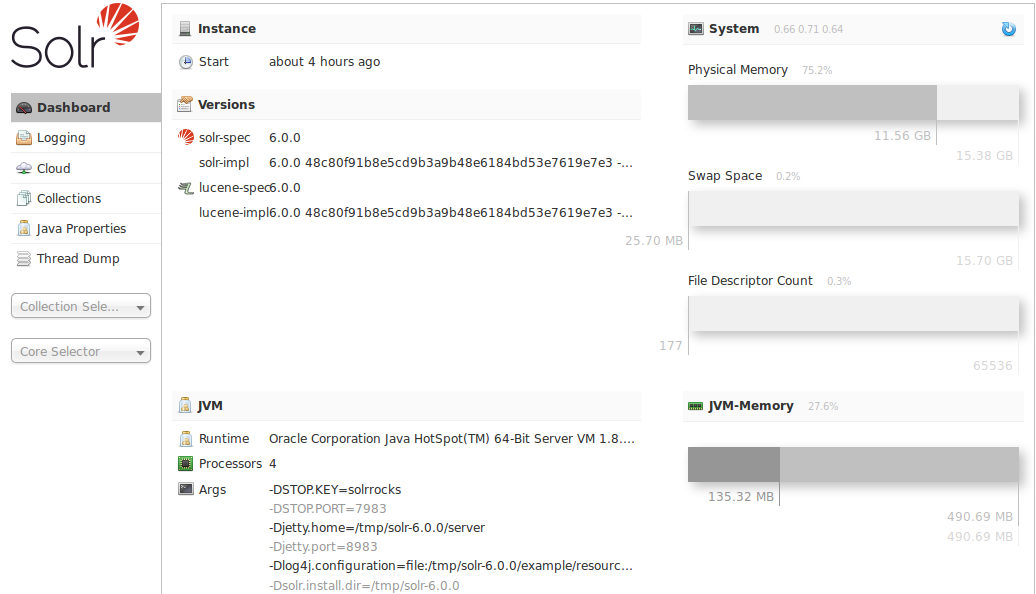
Key features
- Use open-source plugins to tailor the platform to your needs.
- Add documents using various programming languages like JSON, XML, CSV, or HTTP.
- Access an extensive resource library to learn more and get started with Solr.
Pricing
- Available for free.
7. Bleve
Bleve is an open-source search and metrics platform. It can index just about any object in your data model. If you need to tweak how search results are shown, you can change the default settings easily. If you want robust indexing and querying functionalities, this tool is for you.

Key features
- Get multi-language support.
- Combine data from different perspectives, such as terms, date ranges, and numeric ranges.
- Use terms, phrases, matches, match phrases, and prefixes to create search queries.
Import one package to get started quickly, then write three lines of code to create an index and three more lines of code to write queries.
Pricing
- Available for free.
Selecting the best Elasticsearch alternative
There are multiple Elasticsearch alternatives available in the market today, each with its own pros and cons. To make your decision easier, here are seven factors to consider:
- Is it simple to install? The tool should be straightforward to set up. For instance, Middleware makes installation easy by collecting metrics, logs, traces, and events with a simple process, unlike Elasticsearch.
- Is it comprehensive? Is the tool self-sufficient—in that can it work without needing additional plugins and apps? Middleware offers full-stack observability for different system complexities and scales, going beyond Elasticsearch’s search capabilities. It covers infrastructure monitoring, logs management, application performance monitoring (APM), and alerts.
- Is it open-source or commercial? In the age of managed observability, Middleware stands out with its out-of-the-box solutions for cloud visibility and 24/7 dedicated support, unlike the open-source Elasticsearch.
- Is it easy to use? A user-friendly interface and robust support resources are central to a positive user experience. Here, Middleware shines with user-friendly features and thorough documentation, making the program accessible to all of your teams—regardless of technical proficiency. Elasticsearch, however, requires a more intricate setup.
- Does it integrate seamlessly? Integration with existing tools can make your team’s life easier. Middleware seamlessly integrates with current tool stacks and is particularly effective in Kubernetes environments.
- How about its customization features? Customization is important for creating custom dashboards, reports, and alerts—all of which are features present in the Middleware software.
- Is the pricing model transparent? Middleware’s flexible pricing makes budgeting easier. However, Elasticsearch’s pricing is more complex and varies with each use case.
Which Elasticsearch alternative should you go for?
All seven Elasticsearch alternatives are worthy of the top spot. But logically speaking, it makes sense to invest in a tool that fits your organizational requirements and budget. In the end, you want a tool that maps to your immediate needs and drives your long-term goals simultaneously.
Middleware is a great Elasticsearch alternative that accommodates your scaling needs at cost-effective prices. Even though Middleware is commercial software (unlike Elasticsearch, which is free to use), its feature-rich functionalities more than makeup for higher costs. You can install the software easily, get end-to-end support for infrastructure and application monitoring, leverage advanced data handling and filtering prowess, and more.
Schedule a demo to see how Middleware can transform your data game, one search at a time.

